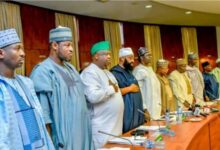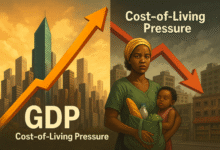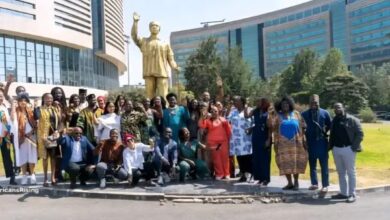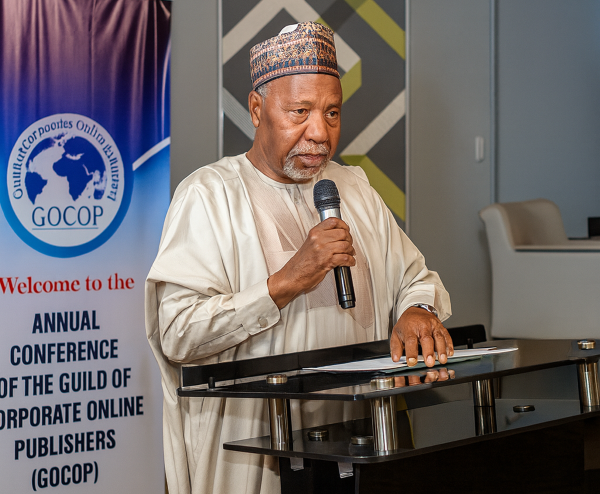
A Call for Accountability and Realism in Nigerian Politics
Former Speaker of the House of Representatives and ex-Governor of Katsina State, Rt. Hon. Aminu Bello Masari, has sounded a timely warning about the widening disconnect between campaign promises made by politicians and the realities of governance once they assume office.
Speaking as the keynote speaker at the 9th Annual Conference of the Guild of Corporate Online Publishers (GOCOP) in Lagos, Masari urged Nigerian leaders to embrace a new political culture grounded in truth, responsibility, and transparency.
The conference, themed “Reconciling Campaign Promises with Governance Realities: Challenges and Prospects,” brought together policymakers, media executives, and thought leaders to discuss how Nigeria can rebuild trust in its democratic institutions.
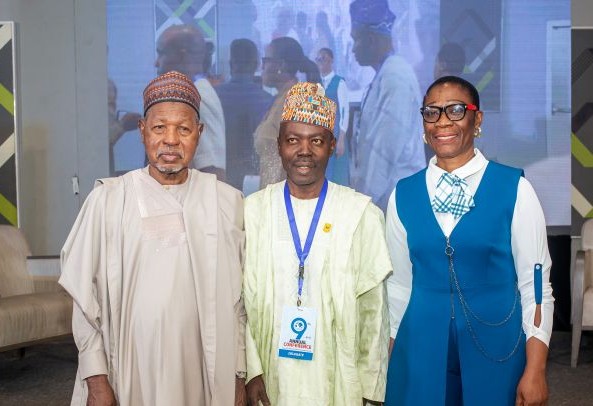
The Crisis of Credibility in Politics
Masari noted that the repeated failure of politicians to fulfill their campaign promises has eroded citizens’ trust in democracy, creating a dangerous credibility gap between the electorate and those in power.
“Unrealistic pledges made merely to capture the mood of the electorate should be challenged and exposed,” Masari declared.
“Only then can we elevate our political culture and ensure that the process justifies the end.”
He emphasized that the essence of democracy is not in making grand promises but in delivering measurable progress within the constraints of available resources.
According to him, the inability of successive governments to balance expectations with execution has led to disillusionment among voters and cynicism toward democratic institutions.
Four Conditions for Closing the Promise–Reality Gap
Masari outlined four key conditions that must be met if Nigeria is to reconcile campaign rhetoric with actual governance outcomes.
1. Responsible Campaigning
He called for ethical and data-driven campaign practices, where political actors base their manifestos on achievable and costed programs, rather than populist slogans.
“Campaigns should be anchored on realism. Politicians must resist the temptation to make empty promises just to win elections,” he said.
2. Strong Institutions
Masari stressed that Nigeria’s governance failures often stem from weak institutions, noting that without competent and independent public institutions, even the best policies cannot be executed effectively.
“Governance must be anchored on strong institutions. With capable institutions, policies can be implemented more consistently and transparently,” he noted.
3. Honest Communication
He urged political leaders to engage in truthful and continuous communication with citizens, explaining trade-offs and the real constraints of policy implementation.
“Leaders must explain why certain promises may take longer to achieve and how progress will be measured. Honesty fosters trust,” Masari said.
4. Informed Citizenship and Media Accountability
Finally, Masari highlighted the role of citizens, civil society, and the media in holding leaders accountable — not through sensationalism, but through factual reporting and constructive engagement.
“Citizens must track promises, demand transparency, and understand the trade-offs. The media should focus on accountability rather than click-driven sensationalism,” he urged.
The Harsh Realities of Governance
Masari offered an unflinching look at why political promises often fail to materialize — citing limited resources, competing national priorities, and unforeseen crises as key barriers.
He noted that while campaign manifestos are often aspirational, they rarely reflect the economic and institutional realities of governance in developing nations like Nigeria.
“Fiscal constraints are a big factor. Many African budgets remain dependent on oil revenues, which are volatile and shaped by global market forces beyond our control,” he explained.
When Crisis Disrupts Governance
Masari referenced the COVID-19 pandemic as a stark example of how sudden crises can derail the most ambitious development plans.
He observed that emergencies often consume national focus, divert resources, and disrupt public expectations — leaving campaign promises unfulfilled.
“COVID-19 forced governments worldwide to suspend their plans and reallocate funds toward emergency health and welfare interventions. Nigeria was no exception,” he said.
He also cited insecurity as a major impediment to governance in Nigeria. The rising cost of maintaining national security, he said, has diverted billions from social and economic programs that could have transformed citizens’ lives.
“Insecurity undermines production, disrupts livelihoods, and reduces national revenue. It compels government to divert enormous resources toward defense, leaving little room for development,” Masari lamented.
The Challenge of Weak Institutions and Corruption
Beyond resource scarcity, Masari identified weak institutions, corruption, and bureaucratic inefficiency as persistent obstacles to effective governance.
“Even when funds are available, corruption and inefficiency derail delivery,” he said.
“Building strong and transparent systems must therefore be a national priority.”
He emphasized that institutional reform, not just leadership change, is crucial for Nigeria’s democratic progress.
Rebuilding Public Trust in Democracy
Masari argued that the credibility of Nigeria’s democracy depends on the ability of its political class to align words with actions. He warned that if citizens repeatedly witness broken promises, they will lose faith in the democratic process altogether.
“Reconciling campaign promises with governance realities is not just about saving face for politicians,” he said.
“It is about protecting the integrity of democracy itself.”
He added that progress, even if modest, can restore citizens’ faith — provided it is explained honestly and delivered consistently.
“Let our promises be realistic, our expectations modest, our governance transparent, and our accountability strong,” Masari said.
“Only then can democracy become a true vehicle for change.”
The Media’s Role: From Watchdog to Bridge
Masari commended GOCOP for creating platforms that foster national dialogue on governance and accountability. He described the media as an indispensable bridge between leaders and citizens in a democracy.
“You shape narratives, hold leaders accountable, and track progress,” he said.
“This is where journalism, at its best — especially digital journalism — becomes indispensable.”
He urged media organizations to elevate political discourse beyond sensationalism and help Nigerians make informed choices during elections.
“Your platforms must challenge false promises and help citizens separate realism from rhetoric,” he advised.
BRANDECONOMY Insight: From Campaigns to Credibility
Masari’s keynote reflects a growing consensus among political analysts that Nigeria must reform its campaign culture to build a sustainable democracy.
In BRANDECONOMY’s analysis, the gap between campaign rhetoric and governance outcomes has been one of the key drivers of public distrust, voter apathy, and governance fatigue across Africa.
Experts argue that a new governance paradigm is needed — one that prioritizes:
- Evidence-based campaign manifestos with measurable benchmarks.
- Open-data systems that allow citizens to track progress in real-time.
- Performance contracts between elected officials and the electorate.
- Independent media monitoring of campaign commitments.
If these measures are institutionalized, Nigeria could move closer to a performance-driven democracy, where credibility becomes the new political capital.
Conclusion: Turning Promises into Progress
Masari’s message resonates beyond politics — it is a call to rebuild trust and restore integrity to public leadership.
Nigeria’s democratic evolution, as BRANDECONOMY observes, will depend not just on who governs, but on how promises are made, tracked, and delivered.
The nation’s next frontier lies in closing the gap between aspiration and achievement — between the words spoken at campaign rallies and the results felt in citizens’ daily lives.
When political honesty becomes a norm and accountability a culture, democracy in Nigeria will not just survive — it will thrive.



